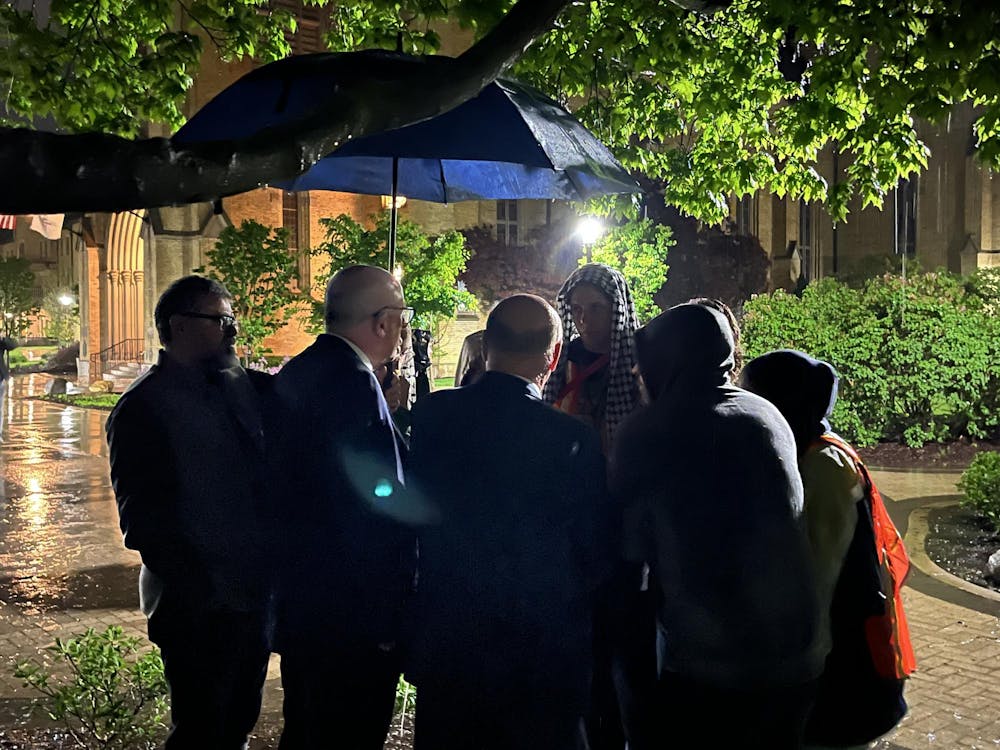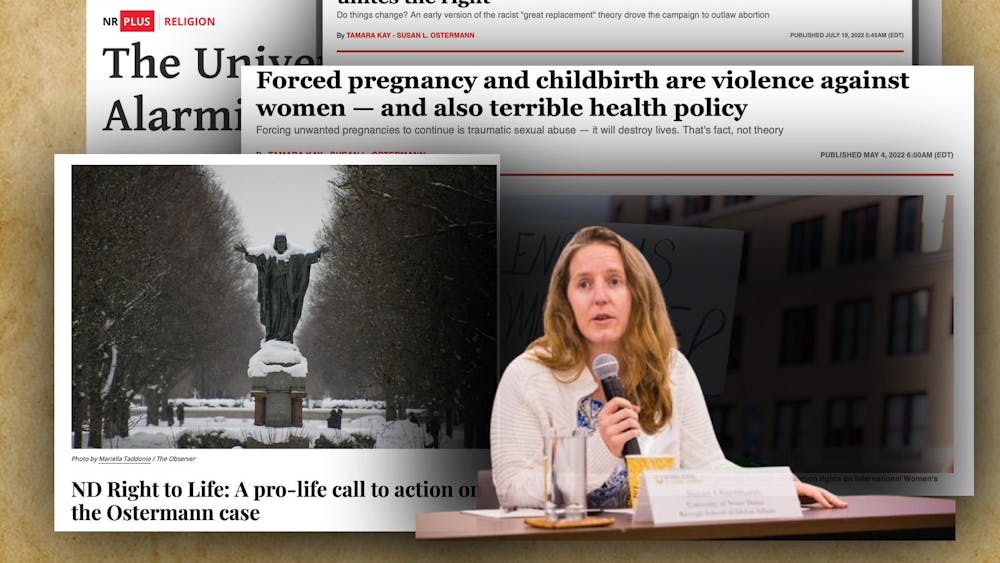The Observer piece on the student arrests on Thursday night painted the administration in a bad light. One might conclude from reading the coverage that the “rain-soaked summit that preceded the arrest of peaceful student protestors was a failure. I suggest a different way to interpret what transpired. Thursday gives us a glimpse into what potentially sets Notre Dame apart as a distinctively Catholic institution of higher learning.
I encountered the “Gaza solidarity camp” on the way to the parking lot across from the Keough School, by the Eck Visitor Center, shortly after 5:00 p.m. I saw a number of faculty as I waded into the crowd: junior and senior, TPAC and endowed. Student leaders included Catholics, Muslims, Jews and agnostics, citizens and internationals, grad and undergrad. The environment was relaxed but purposeful. Students wanted to open a line of communication with the University leadership to have their concerns heard.
I called my dean, Scott Appleby, who I trust as a leading scholar, University leader and mentor. We had briefly discussed the protests from the week prior with empathy. I invited Scott to meet student leaders of the movement face-to-face in a relatively safe and informal space, to get to know them, so he could bring his experience of that encounter into the “smoke-filled rooms” with senior administrators. We had a text exchange. He said he could be there after an important event he was currently attending.
Later, Dean Appleby arrived along with Provost John McGreevy.
But the situation had changed. The camp had moved from the Eck Visitor Center to God Quad. In the glow of the magnificent Golden Dome, hardliners were pushing for escalation as the police issued a deadline to disperse. Tensions were high. It was dark, pouring rain. Arrests were imminent. Reporters and cameras were circling. There was a sense of brinkmanship. As soon as Appleby and McGreevy arrived, students pressed them to accede to the movement’s “demands,” or else. Instead of the original “meet-and-greet” atmosphere I had hoped the dean would encounter, it became a public spectacle, together with the University’s chief academic officer!
The dean and the provost found themselves in an impossible situation. Student organizers saw them as “the administration” and pounced on the opportunity to begin negotiations. For the dean and provost, it was an introduction, an opportunity to learn more and potentially open lines of communication. The fluid and rapidly evolving situation got the better of us. As a result, the “rain-soaked summit” fell far short of expectations. It was not constructive. One deemed the other side immature, the other dismissive.
Where do we go from here?
First, I invite the students to recognize, with gratitude, the goodwill demonstrated by two University leaders on Thursday night. They came out to meet with students in the midst of an active protest. It was a good faith move. Moreover, the University police let the protest continue although it was not registered in advance and lasted close to five hours, even after it had moved to a highly restricted area at the heart of campus. Students were eventually warned before arrests commenced and given a fair opportunity to disperse after the dean and provost had left. Some students chose to be arrested peacefully as an act of civil disobedience. After the arrests, concerned faculty, staff and administrators came together to ensure that charges were dropped. Nobody was expelled or deported. To the extent possible, we must recognize that behind all this is a community of care. Surely, we can find ways to enter into constructive dialogue on what has become the defining moral issue for students nationwide.
Secondly, I invite the administration to think deeply about Notre Dame’s faith-based mission and identity. In the wake of widespread protests advocating for civil rights and against the Vietnam War, Fr. Ted Hesburgh wrote in 1969: “The university cannot cure all our ills today, but it can make a valiant beginning by bringing all its intellectual and moral powers to bear upon them: all the idealism and generosity of its young people, all the wisdom and intelligence of its oldsters, all the expertise and competence of those who are in their middle years. But it must do all this as a university does, within its proper style and capability, no longer an ivory tower, but not the Red Cross either.”
We are God, Country, Notre Dame. It is no secret that our country maintains global primacy in large part through a war economy that research universities actively participate in. Students recognize the contradiction between Catholic Social Teachings and Notre Dame’s entanglement with the military industrial complex in its present form, and they are calling us to account. They are summoning our ideals to testify against us. These ideals are at the heart of the University’s Catholic mission. They thread the fabric of the Keough School of Global Affairs.
In the Keough School’s Dignity & Development blog, professor David Cortright, a Vietnam veteran against the war, reminds us: “Budgets are moral documents.” Are we profiting from conflicts we morally oppose? How do we distinguish between just and unjust wars in an investment portfolio? Is it possible to disentangle (or divest), wholly or in part, from a war economy without compromising the ambition of Notre Dame to be a leading Catholic research university? Are we ready to pay the price of aligning our investments with our values? What does divestment even look like with a company like Boeing, which develops weapons that kill innocent civilians and commercial airplanes we fly daily?
These are big and complicated questions. The national movement to divest is calling on us to engage them urgently and transparently. The student movement must accept that it is unrealistic to expect quick and simple solutions. A serious process toward divestment will be long and complex, the outcome uncertain. Administrations, in turn, must ponder carefully whether they can continue to ignore vexing moral questions that have brought American universities into crisis.
If Notre Dame simply follows Columbia and Harvard, it risks becoming distinctive for its inability to be distinctive. As an inspired faith-based institution, unique in the landscape of American higher education, we might very well be in the midst of a defining “moment to see,” but we also need “the courage to act.” On Thursday, student protesters with everything to lose, and two University leaders with nothing to gain, demonstrated by coming together that courage is not in short supply. If we proceed sensibly from here, the clouds of the fateful “rain-soaked summit” might have silver linings.
Mahan Mirza
director, Ansari Institute for Global Engagement with Religion
teaching professor of Islam and science, Keough School of Global Affairs










